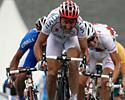Cycling News Flash, April 28, 2009Edited by Laura Weislo Cyclist named in Olympic CERA positives
Two cyclists have been implicated in new doping positives which have come out of retroactive testing of samples from last year's Beijing Games. The Associated Press reported today that two cyclists, three track and field athletes and one weightlifter are the six Olympians who the International Olympic Committee said tested positive for the EPO variant CERA. La Gazzetta dello Sport has reported that one of the positive cyclists is Davide Rebellin, who took second in the road race in Beijing. The Italian Olympic Committee (CONI) has confirmed only that one of the athletes is from Italy, but has not given a name. Rebellin's former trade teammate Stefan Schumacher tested positive for CERA following retroactive testing of Tour de France samples last October. The tests were completed after the German had already participated in the Olympic time trial. AP reports also that two of the six were medalists, one in cycling, the other a gold-medal winning track and field athlete. The IOC began performing retroactive testing on the Beijing Olympic Game samples in January using a newly developed test for the recently introduced EPO drug Mircera. Several riders tested positive for the same drug during the 2008 Tour de France. Seven samples of 847 total tested from the Olympic Games turned up positive for CERA. Two of the positives were from the same athlete. The ICO confirmed that it used the same blood test which the French anti-doping agency AFLD used last year to declare Stefan Schumacher, Bernhard Kohl and Leonardo Piepoli positive following retroactive testing of Tour de France samples. Rebellin, Kohl and Schumacher were teammates on the now-defunct Gerolsteiner squad. In the re-testing, the ICO said it "focused primarily on endurance events in cycling, rowing, swimming and athletics." "Most of the work was conducted at the WADA-accredited laboratory in Lausanne, in close collaboration with the accredited labs in Paris and Cologne," the IOC announced. According to CONI, the positive was on the 'A' sample only. Any positive athlete has the right to request confirmation testing of the 'B' sample. "The further analysis of the Beijing samples that we conducted should send a clear message that cheats can never assume that they have avoided detection," said Arne Ljungqvist, Chairman of the IOC Medical Commission. "The vast majority of athletes do not seek an unfair advantage. We intend to do all we can to ensure that they have a fair environment for competition." The IOC said it is notifying the athletes of any "adverse analytical finding" through their National Olympic Committee (NOC). CONI announced that it had forwarded the IOC documents onto its Antidoping prosecutor. Athletes from Italy signed a declaration before participating in the Olympic Games promising not to violate the World Anti-Doping Agency's rules. The IOC allows retroactive testing of samples up to eight years after collection, allowing athletes to be tested for substances as newly validated tests are developed. The first rider to test positive for CERA was Italian Riccardo Riccó. He was kicked out of the Tour de France following the test. The AFLD performed retroactive testing on blood samples of riders who it had targeted for having either suspect performances or suspicious blood values or urine test results. Discuss the topic in the Cyclingnews forum. (All rights reserved/Copyright Future Publishing (Overseas) Limited 2009) | ||

|
January 2009 |
Recently on Cyclingnews.com |

